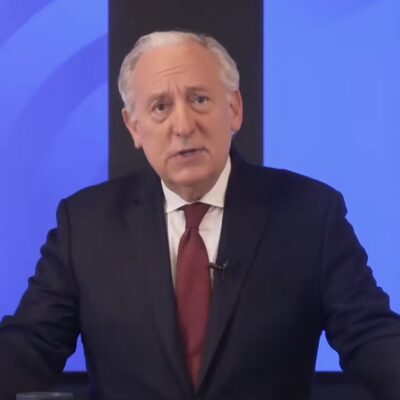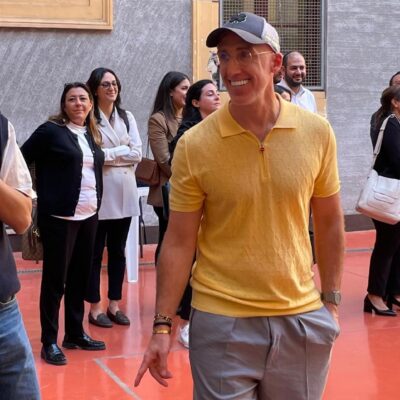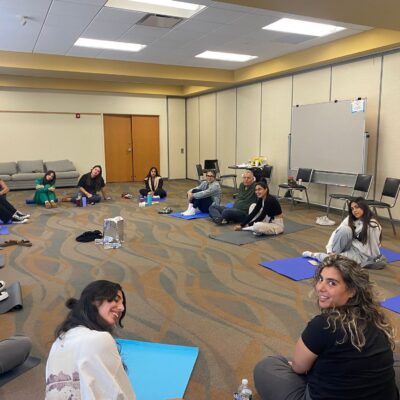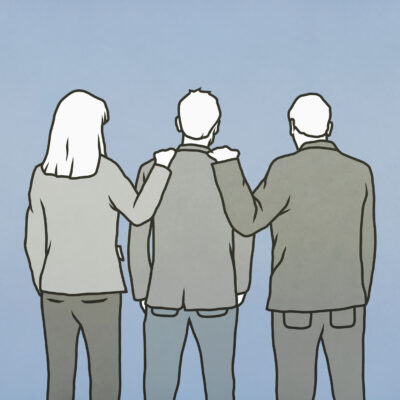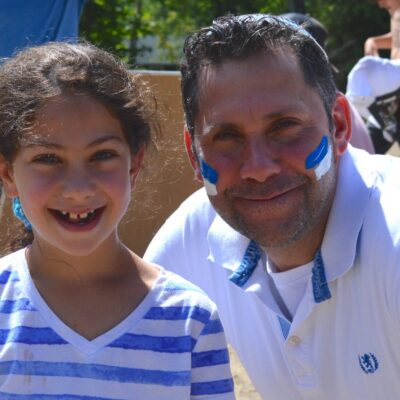EXPANDED OFFERINGS
As Israel travel drops post-Oct. 7, RootOne to fund shorter trips, Israel-focused domestic programs
Organization, which normally only subsidizes 3-week experiences, will help pay for 1-week volunteering trips, Young Judaea programs with Israeli participants

Courtesy/RootOne
North American teens on a RootOne-supported Israel trip.
RootOne, which normally subsidizes extended Israel programs, will offer vouchers for shorter trips and for domestic programs that include large numbers of Israeli participants this year in light of a roughly 90% reduction in the number of North American teens expected to come to Israel this summer, the organization said.
This year, the organization will also provide vouchers for two-week trips to Israel in the winter, a break from its normal requirement that trips last at least three weeks in order to be eligible for the subsidy.
“We expected to bring 6,500 [teens to Israel] this summer, and we’re on track to bring 650 this summer [on full 3-week trips],” Simon Amiel, the executive director of RootOne, told eJewishPhilanthropy.
To reach more North American teenagers, the organization determined that it had to expand its offerings, at least for this year, Amiel said.
Amiel said RootOne, an offshoot of the The Jewish Education Project created in 2020, is primarily focused on educational impact, particularly through a meaningful encounter, or mifgash, between American and Israeli teenagers. While the organization still believes that “an Israel experience is the ultimate opportunity” for that, the current realities have forced the organization to be “more flexible” about its approach, he said.
“The situation has motivated us to experiment more,” Amiel said.
So this summer, the organization, which is primarily funded by the Marcus Foundation, will subsidize five other programs, including shorter volunteer programs in Israel through BBYO and Alexander Muss High School in Israel.
“We will also offset costs for domestic experiences, which is really something we never thought we’d be doing,” Amiel said.
The two domestic programs — the Hadracha and Merkaz programs at Young Judaea’s Camp Tel Yehudah in Barryville, N.Y. — are the result of a joint initiative by RootOne and the Israeli government-backed Mosaic United.
Amiel said Mosaic United offered to bring Israeli teenagers to the United States if RootOne would offset the costs for the American participants.
“Our managing committee came to a decision that we would invest in modified vouchers for the North American teens… but that the focus needed to be on Israel and that a significant number of Israeli teens need to be involved,” Amiel said.
The Hadracha program will focus on leadership and activism, including a four-day trip to Washington, D.C., to meet elected officials. The Merkaz program focuses on Jewish identity and Israeli history and culture.
“Extensive research has validated time and again that connection with Israeli peers is one of the most powerful tools to prolong and maximize the impact of teen immersion experiences,” Hila Rosenmann, RootOne’s director of program strategy, said in a statement. “We know that travel numbers to Israel will be much lower this year than in prior summers. But this new inclusion of Israeli teens in the Young Judaea programs allows us to create a unique immersion experience that fosters bonds and connections similar to our flagship Israel programming.”
An additional 350 North American teens are expected to participate in these new and newly subsidized programs, according to Amiel. Another 250 are expected to come on winter trips, he said, but added that this estimate may change.
Amiel said the organization views these changes as a “one-off,” in light of the specific post-Oct. 7 circumstances, not a change in policy. Yet Amiel added that some aspects of this summer’s offerings will serve as a “pilot” for future years.
“Offsetting the costs for volunteers to come for one week — that’s likely a one-off for this year,” he said, but including extended volunteer work in RootOne-supported Israel trips may remain.
The shorter trips in the winter are also allowing RootOne to work with two new trip providers who didn’t meet the organization’s three-week requirement in the past, he said.
“Our ambition is for every Jewish teen to arrive on their college campus with a deep connection to the Jewish community and to Israel,” Bernie Marcus, the chairman of the Marcus Foundation, said in a statement. “We are building RootOne to be the engine of innovation that will get us there. This expansion initiative will be the first of many.”
Ordinarily, RootOne requires the recipients of its vouchers to participate in 8-9 hours of educational programming — often through Enter: The Jewish Peoplehood Alliance’s One2One program, which facilitates conversations between American and Israeli teens — but the organization is removing those requirements for the shorter programs, Amiel said.
Recipients of these special vouchers will also still be eligible for vouchers for extended Israel trips in the future.
“We want them to remain eligible and motivated to go on an Israel experience,” Amiel said.

 Add EJP on Google
Add EJP on Google





